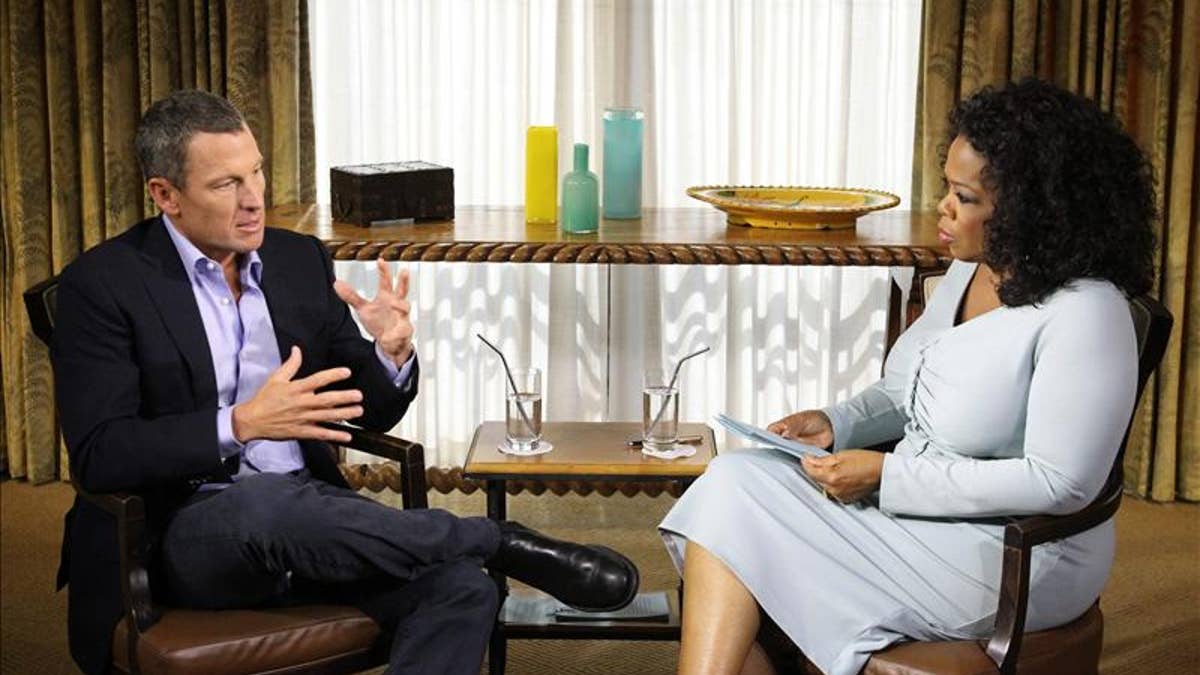
LONDON – Lance Armstrong's doping confession to Oprah Winfrey was "too little, too late" and failed to provide any new information that will help clean up the sport he tarnished through years of cheating, the vice president of the IOC said Friday.
A day after stripping Armstrong of his bronze medal from the 2000 Sydney Olympics, the IOC urged the disgraced former Tour de France champion to supply details to anti-doping authorities in order to "bring an end to this dark episode."
In an interview with The Associated Press, IOC vice president Thomas Bach said Armstrong's admission to Winfrey -- after years of vehement denials -- that he used performance-enhancing drugs was not enough.
"If he thinks this interview would help him get credibility back, I think this is too little, too late," said Bach, a German lawyer who leads the IOC's anti-doping investigations. "It's a first step in the right direction but no more.
"If he really loves his sport and wants to regain at least some credibility, then he should tell the whole truth and cooperate with the relevant sports bodies."
Armstrong is under pressure to come clean to the World Anti-Doping Agency, the U.S. Anti-Doping Agency and the independent commission set up the International Cycling Union.
"We have three sports bodies he can address," Bach said by telephone. "He needs to give testimony under oath. After lying for more than a dozen years, he needs to be questioned by experts and not just in a well-orchestrated interview."
In a statement from Lausanne, Switzerland, the IOC said: "We now urge Armstrong to present all the evidence he has to the appropriate anti-doping authorities so that we can bring an end to this dark episode and move forward, stronger and cleaner."
The sentiment was echoed by World Anti-Doping Agency director general David Howman, who said Armstrong's interview offered no more than "convenient truth." Armstrong would need to tell all to anti-doping authorities to have any chance of reducing his life ban.
"He would have to do what he's doing on oath to have any effect under the (WADA) code," Howman told the AP in a phone interview. "You can't talk to a talk show host and have any legal effect. There would have to be substantial assistance to the anti-doping community."
Armstrong's comments to Winfrey, he said, did not amount "even to assistance, let alone substantial assistance."
In the interview with Winfrey, Armstrong acknowledged that he used EPO, testosterone, human growth hormone and blood transfusions in order to win the Tour de France seven times.
"This is not enough," said Bach, who is a leading contender to succeed Jacques Rogge as IOC president in elections in September. "I hoped he would be more precise, that you would get an idea of who were the people behind him. He's even protected the famous Dr. Ferrari."
Bach was referring to Italian doctor Michele Ferrari, who worked closely with Armstrong and has been accused of being a mastermind of the cyclist's doping program.
"In some parts of the interview he was pretty evasive, in some parts contradicting himself," Bach said.
Bach said the interview offered no information beyond the USADA report that detailed widespread doping by Armstrong and his teammates and led to the stripping of his Tour titles and a lifetime ban from Olympic sports.
"We have no new facts -- not a single new fact going beyond the USADA report," Bach said.
Armstrong denied in the interview that cycling body UCI covered up positive tests or helped him avoid detection.
Bach said the interview provided no allegations that would put cycling's Olympic status in jeopardy. Senior Canadian IOC member Dick Pound, a former head of WADA, suggested earlier this week that cycling could be kicked out of the Olympics if there was proof of UCI collusion with Armstrong.
"I still hope for a full inquiry, but in general, you have to consider the anti-doping system since then has changed very much for the better," Bach said. "The UCI has introduced the blood passport, there is more target testing and out-of-competition testing and better methods for detecting EPO. You cannot draw conclusions from 10 years ago."
In Lausanne, the IOC said it "unreservedly condemns" the actions of Armstrong and all drug cheats.
"This is indeed a very sad day for sport but there is a positive side if these revelations can begin to draw a line under previous practices," the statement said. "It is the IOC's firm expectation that all parties involved will draw the necessary lessons from this case and continue to take all measures to ensure a level playing field for all athletes."
